
-14-07-2024-
Fifteenth Sunday in Ordinary Time, cycle 2
Gospel reading: Mark 6:7-13
vs.7 Jesus summoned the Twelve and began to send them out in pairs giving them authority over the unclean spirits. 
vs.8 And he instructed them to take nothing for the journey except a staff – no bread, no haversack, no coppers for their purses.
vs.9 They were to wear sandals but, he added,
“Do not take a spare tunic.”
vs.10 And he said to them,
“If you enter a house anywhere, stay there until you leave the district.
vs.11 And if any place does not welcome you and people refuse to listen to you, as you walk away shake off the dust from under your feet as a sign to them.”
vs.12 So they set off to preach repentance;
vs.13 and they cast out many devils, and anointed many sick people with oil and cured them.
*******************************************
We have four commentators available from whom you may wish to choose .
Michel DeVerteuil : Holy Ghost Father and late director of the Centre of Biblical renewal .Trinidad W.I
Thomas O’Loughlin: Prof of Hist Theol Uni. of Nottingham NG7 2RD
Sean Goan: Studied scripture in Rome, Jerusalem and Chicago
Donal Neary SJ: Editor of The Sacred Heart Messenger and National Director of The Apostleship of Prayer.
****************************************
Michel DeVerteuil
Lectio Divina with the Sunday Gospels
www.columba.ie
Textual Comments
This passage contains several separate sections. Each has an important message for us today.
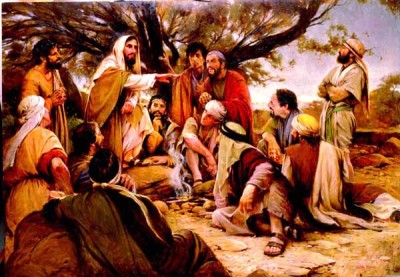 Section 1. Jesus summoned the Twelve.
Section 1. Jesus summoned the Twelve.
He selected a group of people who he felt would be able to represent him before the world. He called them by name so that he could send them into the world not merely as a group, but as individuals.
These disciples then received a mission from Jesus: to make the world a little more as Jesus wants it to be. This is always his work – to take the world as it is and make it the kind that he will be able to offer to God as a fragrant offering in his sight.
This work always has two dimensions. On the one hand it must help people become more committed to being closer to him as their Lord. As they develop within themselves an ever closer relationship with him, they must strive to become more and more like him.
A further purpose of the work is to help the world become more fervent in the Lord’s service. The world must become a place where people will be able to do Jesus’ work among their fellow men and women.
Jesus began to send them out in pairs. This was an important aspect of their mission – they must work together.
He also gave them authority over unclean spirits. They must go among those members of the human race who control and influence what is wrong in the world. The true Spirit of God will always prevent us from looking at those different from ourselves as evil-doers or wrong in some way; an “evil spirit” always works against this.
We as true disciples of Jesus are reminded of times when we too felt within ourselves a desire to “summon” a group of disciples. We wanted them to be more like us. We wanted to send them out into the world to make it more as we would like it to be. The passage is telling us that when we feel like that we are closer to the spirit of Jesus.
 Section 2. Jesus gave them instructions:
Section 2. Jesus gave them instructions:
The first of these was very simple: they must take nothing for the journey “except a staff”. This means two big things nowadays:
– that we must bring something of ourselves to the people we meet in the world; we come to others with our own opinions, our own view of the world;
– that this personal thing we are bringing must not be something for ourselves and against others.
The passage then tells us in some detail what this “nothing extra” really means:
*“no bread” – nothing extra to eat, nothing that we can claim as our own,
nothing that we could draw on in case our method demands a special sacrifice from us;
 *no haversack” – nothing that we could store for the next day in case things get rough; we must go as we are with no special requirements;
*no haversack” – nothing that we could store for the next day in case things get rough; we must go as we are with no special requirements;
*no coppers for their purses”,
nothing that could be put in place for our personal source of sustenance.
* They were to “wear sandals” and “not take a spare tunic” have nothing extra to keep for a future day when things might be different.
Section 3. Jesus then gives them additional instructions:
*Once they have entered a house they are to stay there until they leave the district, staying wherever people are willing to receive them and not moving around looking for a place where they will be even more welcome.
Section 4. Additional instructions if their message is rejected
* If people refuse to listen to them, they must shake the dust off their feet: they must not hold on to a rejection as something that defines them from then on. They must move on in perfect freedom. This will be a clear sign to all as to what has really happened between the giver and the receiver of the message.
Prayer Reflection
“Nowadays people know the price of everything and the value of nothing.“ … Oscar Wilde
Lord, in the world today it is taken for granted that if we want to spread a message we need
*an advertising campaign with glamorous images on television,
catchy jingles on the radio, and posters in public places.
Of course, this requires plenty of money.
We followers of Jesus seem to think we too must adopt this way of spreading the message.
 But for Jesus the truth of his message was the most important thing.
But for Jesus the truth of his message was the most important thing.
This is why, when he summoned the Twelve and sent them out, giving them authority over unclean spirits,
he instructed them to take nothing for the journey –
–no bread,–no haversack,–no coppers for their purses;– no spare tunic.-– and enter into the mind of Jesus.
Lord, forgive us that we think we can do your work alone,
forgetting that we are all in need:
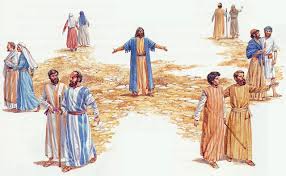 – men and women must complement each other;
– men and women must complement each other;
– while each of us has gifts, we also have defects that others must make up for;
– those who disagree with us bring a new dimension to our ideas;
– our church needs the gifts of other churches.
Remind us that unless we are sent out in pairs
we will not have authority over the unclean spirits of our society.
“Do not move from insight to insight, but let each one rest in your heart.” …Theophane Venard, a mystic of the early Church
Lord, often when we read the bible we move quickly from one line to another, from one thought to the next.
But you send your words as Jesus sent the Twelve, to enter deeply into our inner dwelling and to remain there, nourishing and reconciling everything in us.
Lord, when people reject us we feel a lot of anger,
anger that keeps us in bondage, holding us back like mud on our feet.
Help us, Lord, as we walk away, to shake the dust from under our feet,
so that we may be free to give ourselves to others.
“As a social force, a university should enlighten and transform the society in which it lives and for which it should live.” … Ignacio Ellacuria, one of six Jesuits killed in El Salvador, Dec. 1989.
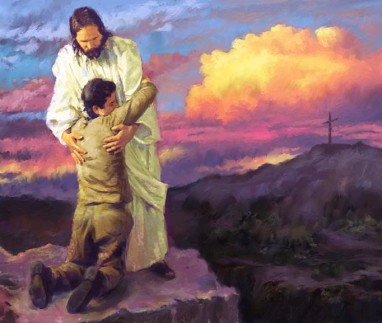 Lord, we pray for all those who work in teaching institutions. Don’t let us remain turned in on ourselves; send us out as Jesus sent his disciples.
Lord, we pray for all those who work in teaching institutions. Don’t let us remain turned in on ourselves; send us out as Jesus sent his disciples.
Many people are complacent – help us to go out and teach them repentance.
There are terrible demons abroad: materialism, individualism, racism, sexism – help us to cast them out.
There are many sick people, the lonely, the downtrodden, the victims of discrimination – help us to anoint them with oil and to cure them.
“I have a great fear in my heart that one day, when they turn to loving, they will find we have turned to hating.” ...A black priest in Alan Paton’s book about South Africa, ‘Cry the Beloved Country’
Lord, preserve us from rejecting the hand of friendship, lest we find one day that those we want to love have shaken the dust from under their feet as a sign to us.
*************************************
Thomas O’Loughlin
Liturgical Resources for the Year of Matthew
www.columba.ie
Introduction to the Celebration
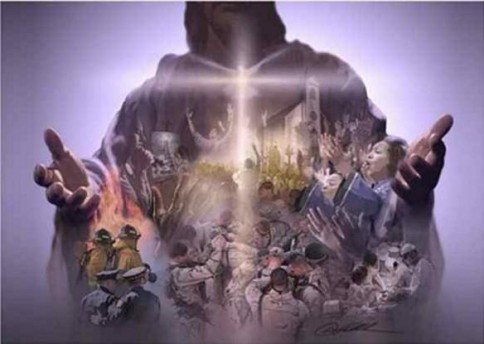 We assemble as a people who have been called to be bearers of God’s love to all humanity. Each of us is called to be a witness to God’s presence in the world in some unique way in some unique part of the creation. Each of us has been sent out by the Christ to proclaim good news, announce forgiveness, and to build the kingdom of peace. This is the reality of vocation. And thinking about and celebrating our individual vocations is something we are going to do today.
We assemble as a people who have been called to be bearers of God’s love to all humanity. Each of us is called to be a witness to God’s presence in the world in some unique way in some unique part of the creation. Each of us has been sent out by the Christ to proclaim good news, announce forgiveness, and to build the kingdom of peace. This is the reality of vocation. And thinking about and celebrating our individual vocations is something we are going to do today.
Homily Notes
1. Sometime between the Council of Trent (mid-sixteenth century) and the French Revolution (late-eighteenth century) a radical shift took place — almost without anyone noticing — in how priesthood, the other grades of Holy Orders, formal ministry, and vocation were viewed within Catholic spirituality. In effect, the notion of vocation, ministry, and order became coalesced into one package. This had the effect of removing the notion of vocation from all but priests.
So, for example, if a man became a monk, it was assumed he would go ‘all the way’ and become a priest; meanwhile, the choice of becoming a religious brother, who was not a priest but could become one, became, for many, inexplicable. Similarly, although less obviously, individual Christians were not considered as having a vocation: they simply had jobs alongside of which they had religious obligations.
 2.When, in the early twentieth century, it was realised that a layperson might have a role in the work of Christ, this could no longer be handled with the notion of vocation, and therefore a new category called ‘an apostolate‘ had to be invented. In short, clergy had vocations (some of which were in religious communities);
2.When, in the early twentieth century, it was realised that a layperson might have a role in the work of Christ, this could no longer be handled with the notion of vocation, and therefore a new category called ‘an apostolate‘ had to be invented. In short, clergy had vocations (some of which were in religious communities);
women had vocations to religious life (they became nuns), while other people could have ‘an apostolate’ (but this was little more than some job or other that might fit with the practical agenda of the church).
3. How does one tackle this deep-seated confusion within Catholic spirituality? The place to begin is to note that ‘vocation‘ and ‘ministry‘ are two distinct realities within the life of the People of God.
• Vocation relates to an individual and her / his life and work and witness. In the unique situation in time and space where I exist, I am called to be the presence of the love of God, a follower of his Christ, and a temple of his Spirit.
• Ministry relates to the services that the community of the church needs its members to perform towards one another so that it can fulfil the church’s (as a single body) vocation to be the body of Christ and the People of God.
These ministries are as diverse as the Petrine ministry and the person who distributes the newsletters, some relate to the sacred mysteries (e.g. the presbyterate) and some are transitory and needed in only some places at certain times.
An individual’s vocation includes her/his ministry; but one’s vocation must never be reduced to being equated with one’s ministry. For the individual, vocation is always more embracing, more all encompassing, and more demanding than any or all of the ministries she/he fulfils.
 4. The task that faces every one of us, as baptised persons, is:
4. The task that faces every one of us, as baptised persons, is:
• to become conscious that we have a vocation,
• to become aware that we all have several sub-vocations linked to the various situations in which we live: as spouse, parent, child, friend, or fellow worker …,
• to discern what it calls for us to do,
• to value our unique talents,
• to grow in awareness of God’s call as ever present in our lives,
• to become aware of how one’s vocation changes as one’s life-situation changes, and
• to pray for the help to fulfil one’s vocations.
Moreover, we have to pray that we will be given the strength and perseverance that our individual path of discipleship may call us to follow. While we all hope that our vocation will not take us into extreme situations, we have only to think of the extreme situations to see how personal and all-embracing vocation can be. How often has it happened that suddenly someone has realised that his/her vocation also included martyrdom: they had lived a quiet life, now the world changed, and witness was demanded in a new and total way? How often has someone had to face suffering from a chronic disease, and there had to discover the presence of God and a new way of giving witness to the God of love? A Vocation is personal, on going, and demanding……
5. Vocation is often surprising, and it is that zest in individual Christians that allows us to see the Spirit at work in the church. It is in following our vocations – and Amos is a perfect example of this – that we discover the cost of discipleship.
6. The challenge for the community of the church that is highlighted in today’s Liturgy of the Word is to know how the community can help the individuals who make up that community to discover their different vocations. Alas, we put a lot of energy into recruiting ministers; we are not nearly so good in this more delicate and more fundamental task.
7. However, it is worth remembering that the vitality and joy of any Christian community is directly proportional to the extent to which its members have come to own, and respond to, their vocations. In a community made up of people with a keen sense of their vocations and their special talents, it then becomes a matter of linking skills to needs so that all the ministries that the church needs are fulfilled.
**********************************
Sean Goan
Let the reader understand
www.columba.ie
Gospel
After his apparent lack of success in Nazareth, Jesus embarks on the next stage of the work of spreading the kingdom. He challenges his apostles to share in his radical trust in the Father as they go forward, believing that the power they have is from God and knowing that the message is one of repentance — that is, true conversion of heart. Their task is an urgent one and they are not to delay. 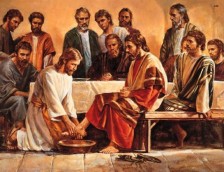 It is worth recalling that when they were first called by Jesus it was ‘to be with him‘. Now, having been with him and coming to know him, they are empowered to do as he has done.
It is worth recalling that when they were first called by Jesus it was ‘to be with him‘. Now, having been with him and coming to know him, they are empowered to do as he has done.
Reflection
These readings show us two sides of the same coin that is faith in God. A genuine faith involves both a grateful recognition of what is given and also a desire to be changed from within and to live accordingly. The people Amos was talking to had plenty of religion — they said their prayers on the Sabbath and offered sacrifices to their God — but this was merely ritual and they had no compunction in exploiting their fellow citizens for the rest of the week.
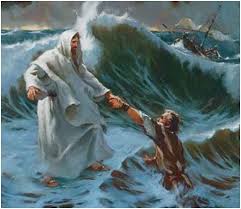 On the other hand, in his writing to the Ephesians Paul is completely overwhelmed by the realisation of what God has done for us for in Christ and he cannot but pour out his thanks and praise. When it comes to being disciples, Jesus asks us to develop a habit of trust. This is not a blind faith but a willingness to really come to know him and be changed from within. It is only then that we can share in his mission.
On the other hand, in his writing to the Ephesians Paul is completely overwhelmed by the realisation of what God has done for us for in Christ and he cannot but pour out his thanks and praise. When it comes to being disciples, Jesus asks us to develop a habit of trust. This is not a blind faith but a willingness to really come to know him and be changed from within. It is only then that we can share in his mission.
*******************************************
Donal Neary SJ
Gospel Reflections
www.messenger.ie/bookshop/
Journey of Faith
There is a certain freedom about accepting the word of God and the gospel of Christ. Jesus tells his disciples not to force the truth of the gospel on people. If they don’t accept it and welcome it they are to move on.
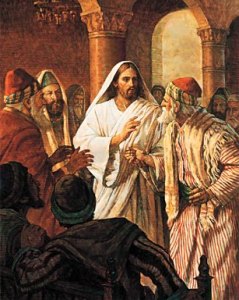 The journey of faith is complicated and a long journey. People accept bits and pieces at times, and remain open to further growth. We sometimes expect too much of people and forget that their life stories and their struggles may make it too much to accept a lot of the gospel. Is the person whose spouse left him or her condemned forever to a single life? Or some types of criminal people never to be forgiven and welcomed back in the church?
The journey of faith is complicated and a long journey. People accept bits and pieces at times, and remain open to further growth. We sometimes expect too much of people and forget that their life stories and their struggles may make it too much to accept a lot of the gospel. Is the person whose spouse left him or her condemned forever to a single life? Or some types of criminal people never to be forgiven and welcomed back in the church?
The reason the apostles would walk away is that people would not listen to them, not that they would not do what they said. We hope for an openness to the gospel from people, as we hope for an openness to everyone’s life story when we try to share the word of Jesus.
This is true for parents and teachers; we open the word of God and the truth of Jesus to younger people, and hope that now or later they will be followers of Jesus. It does not happen immediately.
The prophet Amos seems to come from an ordinary job to be a prophet; from the ordinary ways we try to follow Christ and live out the gospel we can share the best of our faith with another generation.
Have I judged too easily?
Ask for a heart open to the struggles and history of others.
Lord help me to see others as you see them.
***********************************